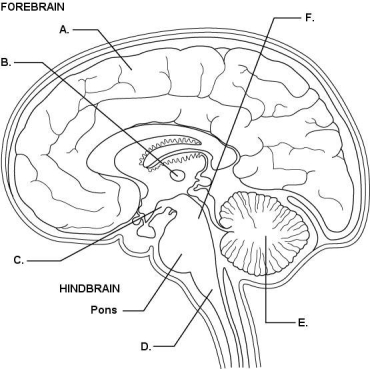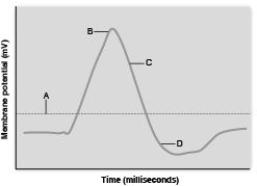Exam 11: The Nervous System: Integration and Control
Exam 1: Human Biology, Science, and Society69 Questions
Exam 2: The Chemistry of Living Things100 Questions
Exam 3: Structure and Function of Cells107 Questions
Exam 4: From Cells to Organ Systems88 Questions
Exam 5: The Skeletal System74 Questions
Exam 6: The Muscular System83 Questions
Exam 7: Blood95 Questions
Exam 8: Heart and Blood Vessels107 Questions
Exam 9: The Immune System and Mechanisms of Defense102 Questions
Exam 10: The Respiratory System: Exchange of Gases81 Questions
Exam 11: The Nervous System: Integration and Control100 Questions
Exam 12: Sensory Mechanisms83 Questions
Exam 13: The Endocrine System82 Questions
Exam 14: The Digestive System and Nutrition80 Questions
Exam 15: The Urinary System70 Questions
Exam 16: Reproductive Systems89 Questions
Exam 17: Cell Reproduction and Differentiation78 Questions
Exam 18: Cancer: Uncontrolled Cell Division and Differentiation77 Questions
Exam 19: Genetics and Inheritance71 Questions
Exam 20: DNA Technology and Genetic Engineering71 Questions
Exam 21: Development and Aging72 Questions
Exam 22: Evolution and the Origins of Life78 Questions
Exam 23: Ecosystems and Populations74 Questions
Exam 24: Human Impacts, Biodiversity, and Environmental Issues71 Questions
Select questions type
 The figure above shows a sagittal section through the brain. Match each labeled part (A-F) of the brain with its function.
-the most highly developed part of the brain; the corpus callosum interconnects its two sides; associated with language and conscious thought
The figure above shows a sagittal section through the brain. Match each labeled part (A-F) of the brain with its function.
-the most highly developed part of the brain; the corpus callosum interconnects its two sides; associated with language and conscious thought
(Short Answer)
4.7/5  (39)
(39)
The phrase all-or-none response describes a neuron-generated action potential. Explain what is meant by this phrase.
(Essay)
4.9/5  (35)
(35)
Shifting the membrane potential of a neuron from negative to positive, due to inward movement of sodium ions, is referred to as ________.
(Short Answer)
4.8/5  (37)
(37)
Match the following types of neurons with their descriptions.
Correct Answer:
Premises:
Responses:
(Matching)
4.8/5  (36)
(36)
Given a particular neuron, an action potential either occurs or does not occur, depending on the strength of the stimulus; therefore, the action potential is described as ________.
(Short Answer)
4.8/5  (38)
(38)
All of the following statements about psychoactive drugs are TRUE EXCEPT which one?
(Multiple Choice)
4.9/5  (25)
(25)
Drugs that cause changes in emotions, consciousness, or behavior are known as ________.
(Short Answer)
4.8/5  (38)
(38)
 The figure above shows a sagittal section through the brain. Match each labeled part (A-F) of the brain with its function.
-regulates body temperature and stimulates hunger drive
The figure above shows a sagittal section through the brain. Match each labeled part (A-F) of the brain with its function.
-regulates body temperature and stimulates hunger drive
(Short Answer)
4.7/5  (31)
(31)
The ________ controls many functions in the body, including regulating body temperature and hunger drive.
(Short Answer)
4.9/5  (31)
(31)
An action potential is a long or rapid release of energy, generated by the sodium-potassium pumps of neurons.
(True/False)
4.8/5  (35)
(35)
Which one of the following activities would be facilitated by the sympathetic nervous system?
(Multiple Choice)
4.9/5  (29)
(29)
When an action potential arrives at the axonal bulb, ________ channels open in the presynaptic membrane.
(Short Answer)
4.8/5  (34)
(34)
Cranial nerves and spinal nerves are part of the ________ nervous system.
(Short Answer)
4.8/5  (32)
(32)
The repolarization phase of an action potential is dependent on the sodium-potassium pump.
(True/False)
4.9/5  (35)
(35)
Regulation of the production of breast milk, carbohydrate metabolism, and temperature control are some of the functions of the
(Multiple Choice)
4.9/5  (28)
(28)
 Use the figure above to match the events of action potential propagation with when they occur on the graph (labeled A-D).
-the membrane is depolarized
Use the figure above to match the events of action potential propagation with when they occur on the graph (labeled A-D).
-the membrane is depolarized
(Short Answer)
4.8/5  (31)
(31)
The motor division of the peripheral nervous system sends information to all of the following EXCEPT which one?
(Multiple Choice)
4.8/5  (40)
(40)
A student noticed that every time he smelled a certain perfume in the hallway, it reminded him of his mother. This is due largely to the activity of the limbic system.
(True/False)
4.9/5  (33)
(33)
Which one of the following divisions of the nervous system predominates during the relaxed state?
(Multiple Choice)
4.7/5  (34)
(34)
Showing 21 - 40 of 100
Filters
- Essay(0)
- Multiple Choice(0)
- Short Answer(0)
- True False(0)
- Matching(0)